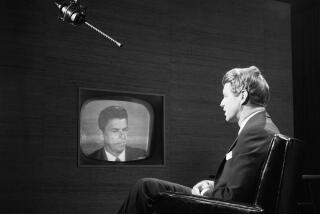Tough-Guy Donaldson: Only an Image
- Share via
It’s about time someone drove a stake through the heart of the Sam Donaldson myth.
I’m referring to the oddly persistent notion that ABC’s Sam Donaldson is a crack TV interviewer--a “good, hard” newsman as analyst Kathleen Hall Jamieson puts it--and that his style of questioning is “effective,” in Howard Rosenberg’s words (“Media Coverage: The Vote Is In,” Calendar, Nov. 2).
In his wrap-up of the 1992 campaign coverage, Rosenberg called Donaldson a “winner” for “proving that rudeness pays” when interviewing “evasive” presidential candidates. He was referring to Donaldson’s pre-election “PrimeTime Live” interviews with Bill Clinton and George Bush, in which Donaldson “badgered” and “interrupted” the candidates “when they appeared to be dissembling.”
Praise like this just shows how low a critic’s standards have sunk. Donaldson has succeeded so long at promoting himself as Mr. Tough Guy that people have forgotten what truly hard questions are.
The fact is, Donaldson’s about as good at interrogating politicians as his makeup people are at styling his hair. True, he badgers--but if you listen to what he’s asking, he’s missing his targets by a country mile.
Take the “PrimeTime Live” segments that so impressed Rosenberg. With Bush, Donaldson boldly asked several versions of his standard question, which is always some variant of “Mr. President, your critics claim you’re an idiot whose policies are dangerous. Is that true?” The answer, of course, is always predictable.
Why should people trust you to fix the economy? asked Sam (Because I’ve got the best policies, duh). Do you still feel Clarence Thomas was your best choice for the Supreme Court? (No, Sam, I’ve changed my mind totally on that. I believe Anita now.) Then there was this little “effective” exchange:
Donaldson: Mr. President, the record seems to show that you coddled Saddam Hussein right up to the moment that he invaded Kuwait.
Pause.
Bush: You’d like me to comment on the statement?
Donaldson: Sure would.
Bush: I don’t think that’s true. . . .
What did Donaldson think the President would say? Yup, you sure got me there, Sam. We coddled him. Appeasement. Pure and simple. I wasn’t going to admit it, but hey, you’ve backed me into a corner here.
The words may be tough, but the questions are (therefore) easy--mere invitations to candidates to restate their policies for the 500th time.
Then there are the lines of questioning that can’t go anywhere. Rosenberg seems to have liked the parts where Donaldson and the candidates debated statistics. True, these at least hinted at real disagreements. But if I say there were X new jobless claims, and you say there were Y, we’re stuck. We can only call a draw--which is just what Donaldson ended up doing.
There’s also the badgering and interrupting that never would have been needed if Donaldson had just shut up and listened. An example was Donaldson’s questioning of Clinton over Supreme Court “litmus tests,” where he repeatedly interrupted as Clinton was attempting to answer.
With all due respect, Sam, you were really being dense here.
And that’s the problem. Journalists need to be at least as smart as their sources. Many, including Donaldson, aren’t.
Good interviewing takes more than “badgering.” It takes brains; it takes knowledge. Journalists question our leaders on our behalf. It’s too bad Rosenberg thinks we should be satisfied with a stand-in like Sam Donaldson.
More to Read
The complete guide to home viewing
Get Screen Gab for everything about the TV shows and streaming movies everyone’s talking about.
You may occasionally receive promotional content from the Los Angeles Times.






